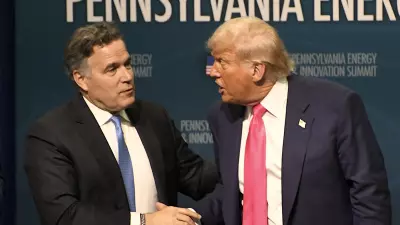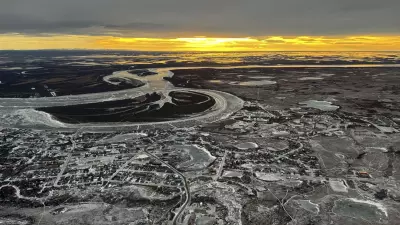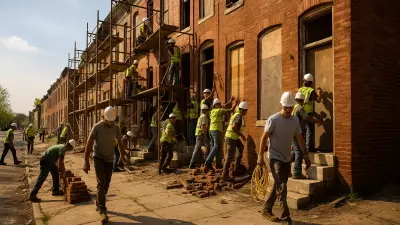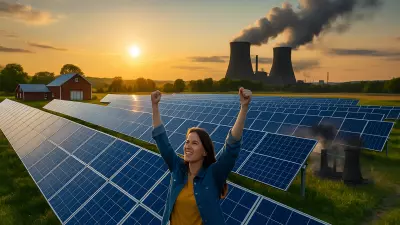The Keystone State has the natural resources, workforce, talent and industrial might to lead America in the artificial intelligence race, Republican Pennsylvania Sen. Dave McCormick and executives in the energy, tech and investment sectors noted.

They announced more than $90 billion in investments in the commonwealth’s energy generating assets, data centers, and workforce development at a Pennsylvania Energy and Innovation Summit hosted by McCormick at Carnegie Mellon University in Pittsburgh.
Trump attended the summit, where he joined business leaders in a discussion with several members of his cabinet.
“Today, the commonwealth is reclaiming its industrial heritage and taking its place at the forefront of the AI technological revolution,” Trump said.
The Budget Reconciliation Act Trump signed on July 4 repeals sections of the 2022 Inflation Reduction Act that provided incentives for renewable energy and energy efficiency, which critics have said will eliminate cost-saving opportunities for consumers and increase reliance on fossil fuels.
Last week, Trump issued an executive order that directed Treasury Secretary Scott Bessent to eliminate tax credits for wind and solar power projects and Interior Secretary Doug Burgum to find and do away with regulations and policies that give preference to wind and solar energy.
Trump badmouths renewable energy… again
“I ended the green new scam,” Trump said, using a derisive nickname for a broad range of energy and economic policy goals to advance renewable energy. He then falsely claimed the Biden administration had caused further decline in the already fading coal industry.
“I also ended [former President] Joe Biden’s war on clean, beautiful Pennsylvania coal. Totally ended,” he said.
The use of coal diminished over decades as somewhat cleaner oil and plentiful natural gas replaced it.
Trump also touted an executive order issued in May reforming the Nuclear Regulatory Commission, which he said would allow Pittsburgh-based Westinghouse to move forward with the construction of 10 new nuclear reactors. The company said the projects would support 15,000 new jobs and generate $6 billion economic activity.
That’s one of the 20 projects McCormick highlighted in the summit. Others include a $3 billion deal between Google and investment firm Brookfield to repower two 1930s-era hydroelectric dams on the Susquehanna River; a $3.4 billion project by Constellation Energy to increase the output of its nuclear power plant near Limerick, Montgomery County; and a $25 billion investment by asset manager Blackstone in power generation, data center and infrastructure development in northeast Pennsylvania.
McCormick said the summit itself served as a catalyst for the projects.
“We said, ‘Listen, we’d love an opportunity to put you on a national stage to talk about the importance of Pennsylvania. Can you accelerate and finish?’ And that’s what’s happened,” he said.
With the announcements by publicly traded companies, McCormick said he’s confident that the investments will materialize.
“You have commitments on what it’s going to mean in terms of labor and jobs,” McCormick said. “They’re going to do that in front of the entire community, in front of the president of the United States … So I’m pretty confident they’ve been working at this, in some cases, for a long time.”
A Democrat enters the fray
Democratic Gov. Josh Shapiro has also promoted the opportunities presented by the global effort to perfect artificial intelligence as a labor-multipling technology while promoting his own plan to capitalize on the commonwealth’s natural resources and existing energy infrastructure.
Last month, Shapiro announced Amazon Web Services had inked a $20 billion deal to build two data center campuses in Luzerne County adjacent to the nuclear fueled Susquehanna Steam Electric Station and in Bucks County on land formerly used by U.S. Steel.
Shapiro joined McCormick and AWS CEO Matt Garman in a panel discussion moderated by Penn State President Neeli Bendapudi.
Shapiro told reporters at the summit that his administration would work closely with the companies that announced projects to make sure they could get shovels in the ground.
“It’s important that these companies be on the record for what they want to invest, and then it’s critically important that they actually make the investments, and we’re going … to hold them to the commitments that they make,” he said.
Since taking office 2023, Shapiro has also emphasized the need to streamline government permitting and other processes crucial to developing new industries. Executives at the summit said speed is possibly the most important in developing AI projects and the energy resources they need.
Shapiro said that moving fast doesn’t mean compromising public health or safety.
“I think if anything, we’re doing a better job on public health and safety than ever before,” he said. “We’re just moving really, really quickly. So when we can promise speed and transparency in that process, that protects the public interest and it creates economic opportunity.”
Garman said that when AWS was looking for places to make investments Pennsylvania rose to the challenge.
“Number one, the infrastructure here is great,” Garman said. “There’s fantastic talent, and that’s another really key piece of it, is that we need people to help us go and build there.”
A common theme among the promised investments is the creation of tens of thousands of jobs in the construction trades and operating and maintaining facilities. Speakers stressed the need for educational investment to ensure Pennsylvanians have skills the companies need.
AI tech firm Anthropic said it will inject $1 million in cyber security education for middle and high school students and provide an equal amount to CMU for energy research. And the Energy Innovation Center in Pittsburgh announced it would build a first-of-its-kind regional training facility for energy and AI infrastructure workers.
In another panel, Mike Rowe, the host of Discovery Channel’s “Dirty Jobs” and the founder of a nonprofit that supports vocational education, said those jobs would be an opportunity to reach young people who feel left behind.
“We’ve been telling kids for 15 years to learn to code,” Rowe said. Yeah, well, AI is coming for them. They’re not coming for the welders. They’re not coming from the plumbers. They’re not coming from the steam fitters or the pipe fitters or the HVAC. They’re not coming from the electricians.”







